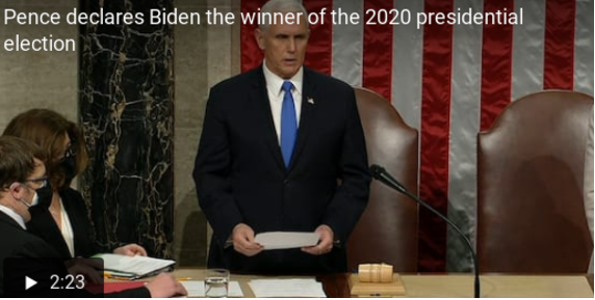Overview
Given the Covid-19 pandemic and the election of Joe Biden and Kamala Harris in the year 2020 to be the 46th President and Vice President respectively. All of us need to change the mistakes made by Donald Trump. As a nation and for all of us “surviving” the last four years, we have learned many things. A key item for those of us who are over 50 years old is that Trump was trying to abolish Medicare Care for everyone that President Obama created in his Administration during his two terms as President. There is more, but the management (actually mis-management) of the Covid-19 pandemic had a devastating impact on the world and especially the USA where there have been over 9 million cases and 400,000 deaths.
Then the most recent Federal Government mistakes where in the state election votes went to Biden by a large number that Vice President Pence chaired the final voting results.

Trump lost due to his actions and at the end trying to get Georgia votes recounted. Then after Biden won, Trump started “rallies” around the USA. His last attempt to get his Presidency back was on Wednesday 6 January 2021when he was near the USA Capital building in Washington, DC. Trump yelled out to his thousands of followers (mostly men) to go raid and destroy the House from voting to impeach him. However, it happened because House Chair Nancy Pelosi and Vice President Pence got the Impeachment earlier that day. Trump was afraid of being impeached again, this time by the Senate even due to his Vice President Pence who was going to chair the Senate vote which was not done due to the riot there in the afternoon. After the House votes, Trump’s followers raided and broke into the Capital building. Five people were hurt and one died (a military person) in the building who tried to help others. You might ask, why do we need to know all of these new things? Or why not try and fix some of problems ourselves? Why not ask a grandchild? Or pay somebody to come over to my house to fix something? Well certainly you can take advantage of those in-person opportunities with friends, colleagues, skilled professionals and relatives. However, there are many situations when you either do not have the money to pay somebody or have relatives close to where you live. You may need a family member, cousin or friend to help you live alone either in a remote area or even in the heart of a city. What you are seeing below is the rioting of Trump supporters after his speech in the morning. They raided the Capital building to stop the elected people and their staff to stop Trump’s impeachment. Trump wanted to stay as President, however with no concern for people, costs and the American democracy.

What all of this does also is create not only violent behavior and deaths as well as mental problems. This is becoming more and more frequent and dangerous to everyone. Let’s go over three areas where mental health impacts people of all races, color and ages by starting with us baby boomers.
1) Health is First
Several years ago, a friend of my younger brother (Wayne W. Clark PhD) stated that he did not touch “gas pump handles” because he was concerned about “germ transmission”. Back then it seemed to be excessive. Yet many people opened door handles with their sleeves of their jackets, shirts or sweaters over their hands. They also were concerned about germ transmission.
Wayne was in the behavioral health field due his working in the San Francisco Health Department. Aside from the “aids” pandemic spreading in Northern and Southern California that spread in the 1980s, Wayne was drawn into the literature on obsessive compulsive disorders, research literature that included examples like excessive washing of hands. Indeed, there are a number of ways to obsess about a thing, a person, event, etc. though these are all descriptions of behavior not necessarily disorders. Since I worked in San Francisco then, I got to meet and know many of the other people in the Health Department as well as those with aids.
Now due to the coronavirus pandemic spreading around the world, the USA has the world’s highest infections and death rates. The general population in these “normal times” has changed such the spreading the Covid-19 pandemic. Today facing a worldwide pandemic with no immediate cure, a relatively high mortality rate, no vaccine, and no clear path to effective treatments, there is a more general sense of anxiety. Store shelves have no paper products; local pharmacies have run out of hand sanitizers; vectors of germ transmission become common table talk; and for those with risk factors like baby boomers, the anxiety has spread faster than the disease.
2) Anxiety is next
Anxiety has become a human disease with health and socio-economic consequences. We are caught in several paradoxes due to mis-information can increase concern especially with little information which can lead to unsafe health practices and life-threatening consequences. For instance, social distance is a critical practice that can prevent the spread of the virus. Failure to engage in social interaction with others, heightens fear of crowds; fear of crowds reduces economic activity, economic activity decline means loss of jobs, loss of investments, etc. We want to keep a balance between knowing what to do being careful and not panicking as illustrated below.
Over the last few months in early 2020, the problem of interacting with others has resulted in huge declines in the stock market, the hospitality, travel, restaurant industries, and the entire consumer economy. Above all, families, relatives and friends have become isolated from being in person to virtual interactionism via iPhone, WhatsAPP, Zoom and more. Business will not be as usual for a long time. Therefore, let us try to promote activities that will prevent or at least bend the curve on this heightened anxiety while assuring the health and safety of our high-risk peers and parents and family members.
The first strategy is to understand the importance of social interaction for baby boomers who have a Pandemic Fear for Older People. Recent studies on longevity show that persons with social connectedness benefit by living longer than those with similar age and health conditions. To start there needs to be a vision of a thriving interactive society which values people to people activities as essential to a full and healthy life. By sharing that vision, we can identify existing social interaction structures already established for promoting those activities, such as assisted living communities, senior community centers, social clubs and other structured social interaction activities.
3) Social interaction
Humans need to create structures since there are not enough as they now exist. They need to be more inclusive, more expansive about the range of activities, and of course more careful about sanitary precautions for everyone. For all of us who have these social outlets (albeit reduced in size), meetings, conferences, family activities including vacations, birthdays, etc. we need to create more carefully planned and safe opportunities for those interactions. Size matters, large gatherings do not make sense, look for places with fewer than 50 people, so you limit the human to human transmission. No more hugging or even shaking hands. Instead we bow to each other, bump elbows, shoes or even our hips. Hands and especially our fingers are the source of transmitting the virus.
Gathering together face to face is not the only alternative to keeping social interaction alive while assisting us to thrive emotionally during this time. This pandemic in this century is fortunate to have technology available that connects people as never before. Social media, streaming, the internet, and telecommunication did not exist in the beginning well into the end of the last century. Today we can find out more about what is going on from the media in real time as The New Normal . Media also connects us with families, friends, colleagues, neighbors and even groups without being in face-to-face contact. Schools, businesses, governments, churches are all expanding their ability to communicate and congregate through the media. We can see each other; talk to each other; listen to each other; advise each other; reach out to each other; get food and other essentials delivered to us while staying within the confines of our own personal environment.
In every crisis there is opportunity. I am sure that the tech industries are exploding with ideas on how to have schools and businesses without walls, while keeping social interaction personal, helpful, and efficient. Let’s further explore opportunities Baby Boomers and the Next Economy are discovering in this global health crisis.
For example, let’s take the tools of the technology modern world and learn how to use them. This exercise will not be exhaustive. In fact, the modern tools can be used for finding an expert, to come onto your smart phone or laptop and teach you how the darn thing works. Even if we show you how to find an expert, we will not identify every circumstance or situation you need to learn more about, fortunately some of these methods will leave you with a feeling of “I can do that”. There are many basic methods to Enact the New Normal for getting and learning opportunities: video conferencing like Zoom (or other ways of connecting to a class or webinar); do it yourself through YouTube, Pinterest (or other video instructions); and streaming an instructional series (e.g. the piano guy). Many of these three modes are free, some require a subscription, and virtually all can be searched on your browser.
A final learning opportunity is the one-on-one tutorial that is also now available thru distance learning. My best example is the “Piano Guy”. An extensive series of piano lessons both in streaming forms and workbooks that enable you to learn to play the piano in your home on your own time with some ease and pace of learning that fits you. The piano guy (like many tutorials) is a subscription that costs money, but there are other apps that can be downloaded without an extra charge.
Learning to play the piano is just one of the many skills you might want to pick up in your senior years, learning to paint, draw or other ways of expressing yourself creatively. Learning to do yoga, Tai Chi, meditate, etc. all can be learned through instructional streaming opportunities. The list is infinite for how to be resilient by learning new things and thriving in that new world you have created.
(*) Woodrow W. Clark II, MA3 PhD [email protected]

